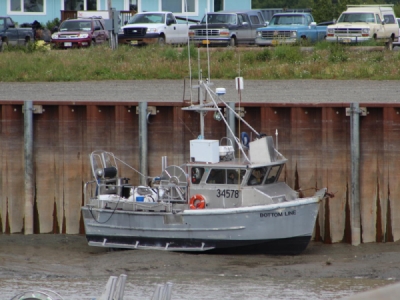
Posted on August 2, 2020
After a summer plagued by a pandemic, plummeting prices, and a global recession, fishing activists are calling for changes to governmental protections for fisheries in Alaska and across the country.
Before this year’s salmon season, federal disaster funding was mostly unavailable to small-boat fishing businesses. Congress amended the Paycheck Protection Program at the beginning of July so that fishermen could apply, and a little later it extended the program’s application deadline. That was a big relief for many fishermen in Alaska.
“My family and I are salmon fishermen,” says Jamie O’Connor, a Bristol Bay set-netter who fishes in Ekuk, and the Working Waterfronts director for the Alaska Marine Conservation Council. “It was really difficult for us to quantify our impacts before our season had happened, so we were really happy to see that there had been an extension and some alterations to the program to allow us to participate.”
This season’s impacts ended up being significant for O’Connor. At the peak of the sockeye run, her processor put the fleet on limits — the company, and many others in Bristol Bay, told fishermen not to fish due to freezer and capacity issues.
“We missed probably half to a third of our season in those three days,” O’Connor adds. “It was a hard thing to sit through, especially with all of the effort that went into preparing for this season. To have done more on the front end to make sure we could do this safely and then just sit out the run was crushing.”
O’Connor says she knows that not everyone in the bay ran into those issues. Still, she says, the way the season played out means fishers are going to need help to make it through the winter.
Bristol Bay’s fishing operations are not the only ones having a rough season. Across the state and the country, fishers are feeling the effects of the pandemic and a global recession.
Linda Behnken is the executive director of the Alaska Longline Fishermen’s Association. She also fishes for halibut, black cod, and salmon.
“We’ve seen drops in prices of 40- to 60% in seafood species harvested in Alaska,” Behnken says. “I know in some parts of the country that’s even higher where markets have completely disappeared and boats aren’t fishing and prices have dropped by 95%.”
Processors in Bristol Bay have started posting a base price of $0.70 — just over half of last year’s base price of $1.35.
Behnken and O’Connor are both part of the Fishing Communities Coalition, an advocacy and support organization for small-boat fishers. In the short term, activists like the two fishers see the Paycheck Protection Program as vital to protecting fishing economies in Alaska. For federal programs like that to work, there must be reasonable deadlines and requirements fishermen can meet.
But fishing businesses will also need longer-term, broader support to remain viable. That’s where they run into a decades-old issue.
Marissa Wilson, another fishing activist and the executive director of the Alaska Marine Conservation Council, clarified that issue: “One of the biggest challenges that we face is how unconventional fishing businesses are in relation to the majority of the American workforce. While the commercial harvest of wild fish has defined coastal economies for decades, fisheries still aren’t on par with the land-based harvesters in terms of federal support.”
Wilson says Department of Agriculture programs, which are unavailable to fishermen, received $9.5 billion dollars in direct aid for farmers and ranchers, and an additional $14 billion dollar replenishment for the Commodity Credit Corporation, which helps to balance distribution and prices of agricultural products. U.S. fisheries received only $300 million dollars.
“Most fishing vessel operators reinvest their earnings back into their businesses,” Wilson added. “Which is great, it stimulates the local economy in a really dynamic way, but it has also hindered valuations of appropriate relief for those businesses because they show very little profit.”
That’s why the Fishing Communities Coalition is calling on Congress and the current administration to appropriate an additional $5.4 billion dollars in aid to support the fishing industry nationwide, an amount comparable to the last reported nationwide dockside value of fisheries.
That money wouldn’t just be for COVID-19 relief. It would bolster and establish other economic viability programs that are longer-term, including grandfathering the fishing industry into federal programs that already exist: the Department of Agriculture procurement and producer programs, Department of Transportation infrastructure and capacity programs, and Small Business Administration disaster loans and support programs, as well as training for future generations of fishers.
2020 is — hopefully — an anomaly, one that is hitting the small-boat fishing industry especially hard because of its reliance on restaurant demand.
“It’s feeling a little overwhelming but we will adapt as we always have, and I always come back to the food aspect of this,” added Jamie O’Connor, the Ekuk set-netter. “I’m going to hang up with you and go put away another 30 fish of home-pack because I think we’re going to need it this year, and that’s really when it all boils down why I come here. Because I’m feeding my family, I’m feeding the world and our nation and that matters. And maintaining that and our connection to each other and the ocean is of paramount importance.”
PPP applications are open to all small businesses, including fishing businesses, until August 8. Alaska has also made some of the state’s CARES Act funds available to fishing businesses, but applications are not yet open.
You can contact the author at sage@kdlg.org or 907-843-3418.
Source: kdlg





